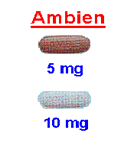| iPsychology
|
|
Ambien ( Zolpidem )
Ambien ( Zolpidem ) is a Sleeping pill from a newer group of drugs called imidzopyridines. Used primarily for short-term treatment of insomnia in adults. Ambien is a sedative-hypnotic used for the short-term treatment of insomnia (difficulty falling or staying asleep).
Some medicines or medical conditions may interact with this medicine.
Use this medicine exactly as directed by your doctor. THIS MEDICINE WORKS VERY QUICKLY; take this medicine right before going to bed. Use it only when you will be able to sleep 7 to 8 hours or longer. STORE THIS MEDICINE at room temperature, away from heat and light. Strengths:
Dosages: Actual dosage must be determined by a physician.
Normal dosage:
Problems with:
Take With: Empty stomach and a full glass of water. Full Benefits In: In a few days. Missed Dose(s): If you take this drug at bedtime and miss it do not take in morning.If within one hour take, if over an hour skip and then continue on your normal schedule. Never Take a Double Dose! If Stop Taking: Do not stop without consulting your physician and never abruptly if you have been taking this drug for over 7 days. Overdose: If overdose is suspected, contact your local poison control center or emergency room immediately. Symptoms of overdose may include difficulty breathing, clumsiness, slowed heart rate, and deep sleep from which you cannot be awakened, and death. Warnings Narcotics may increase the sedative effects of this drug. Do not drink alcohol with this drug, it could decrease your breathing rate to the point of unconsciousness or coma. Do not take this drug with any other drug that might slow the central nervous system, like another sedative, benzodiazepine, sleeping pills, monoamine oxidase inhibitor, antipsychotics, anticonvulsants, or antihistamines.
The habit-forming potential is high. Psychological and physical dependence is possible. Do not stop taking this drug abruptly, this could cause psychological and physical withdrawal symptoms. Do not take this drug if you are pregnant or if planning to become pregnant. Do not take if you are breast-feeding. Do not take this drug if under eighteen and in small doses if over sixty with close monitoring. Do not use if: You had negative reactions to a similar drug in the past. If you have kidney or liver damage. If you have breathing problems or suffer form depression. Zolpidem ( Symptoms or Effects ) Common: Abdominal pain, abnormal dreaming, abnormal vision, amnesia, dry mouth, daytime drowsiness, defective muscular coordination, depression, diarrhea, dizziness, double vision, drugged feelings, euphoria, fatigue, insomnia, lethargy, light headdress, nausea, painful digestion, tenderness/pain in muscles, upper respiratory infection, vertigo, vomiting, headache or confusion. Rare: Abnormal liver function, abnormal secretion/discharge of tears, decrease of white blood cells, abnormal thinking, abscesses, acne, acute kidney failure, aggravated allergies/hypertension, aggression, altered salivation, anaphylactic shock, anemia, boils, belching, breast pain, breast tumors/growths, bronchial spasm, circulatory failure, decreased sex drive, delusions, dementia, decrease of the lymph nodes, disease of the nerves, eye pain, facial swelling, feeling of unreality, feeling strange, fluid in lungs, flushing, frequent urination, glaucoma, gout, heart attack, hemorrhoids, herpes simplex, high cholesterol, hot flashes, hysteria, impotence, increased appetite, illusions, increased lipids in the blood, increased tolerance for the drug, inflammation of a nerve/tendon/vein/artery/external auditory canal/intestines/middle ear/skin/stomach, intestinal blockage, intoxicated feelings, irregular heartbeat, joint disease, laryngitis, leg cramps, low blood pressure, manic reactions, muscle spasms/weakness, neurosis, nosebleeds, oxygen deficiency, general pain, painful/difficult urination, panic attacks, partial paralysis, persistent desire to empty the bowel/bladder, personality disorder, pneumonia, rectal bleeding/pain, restless legs, sciatica, sensation of sparks/flashes of light, sensitivity to light, severe pain along the course of a nerve, shingles, skin discoloration, sleepwalking, spasm of the esophagus, speech impairment, sudden chill with high temperature followed by a sense of heat/profuse perspiration, suicide attempt, temporary loss of consciousness, thirst, tooth decay, ulceration of the cornea, urinary retention, varicose veins, weight loss or yawning. See physician NOW: For any problem listed above. [1] [2] Next Page |

